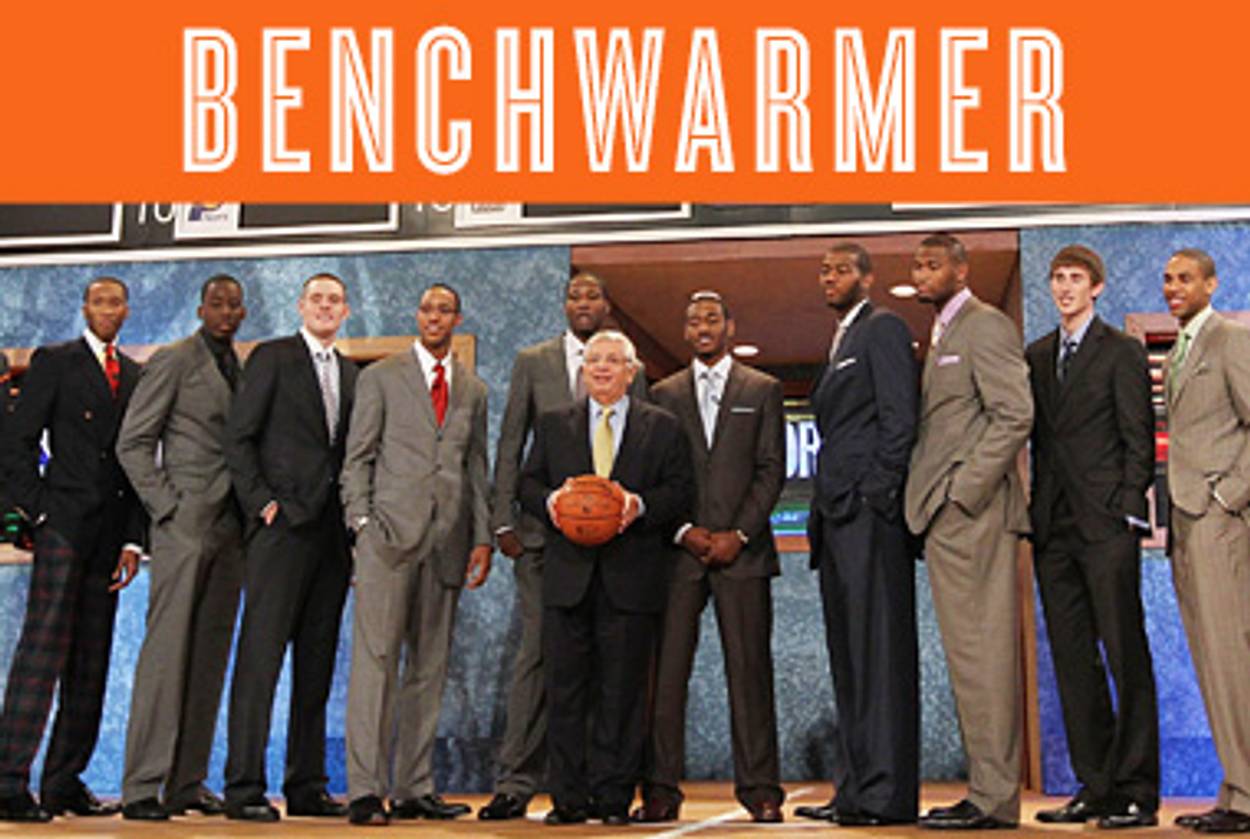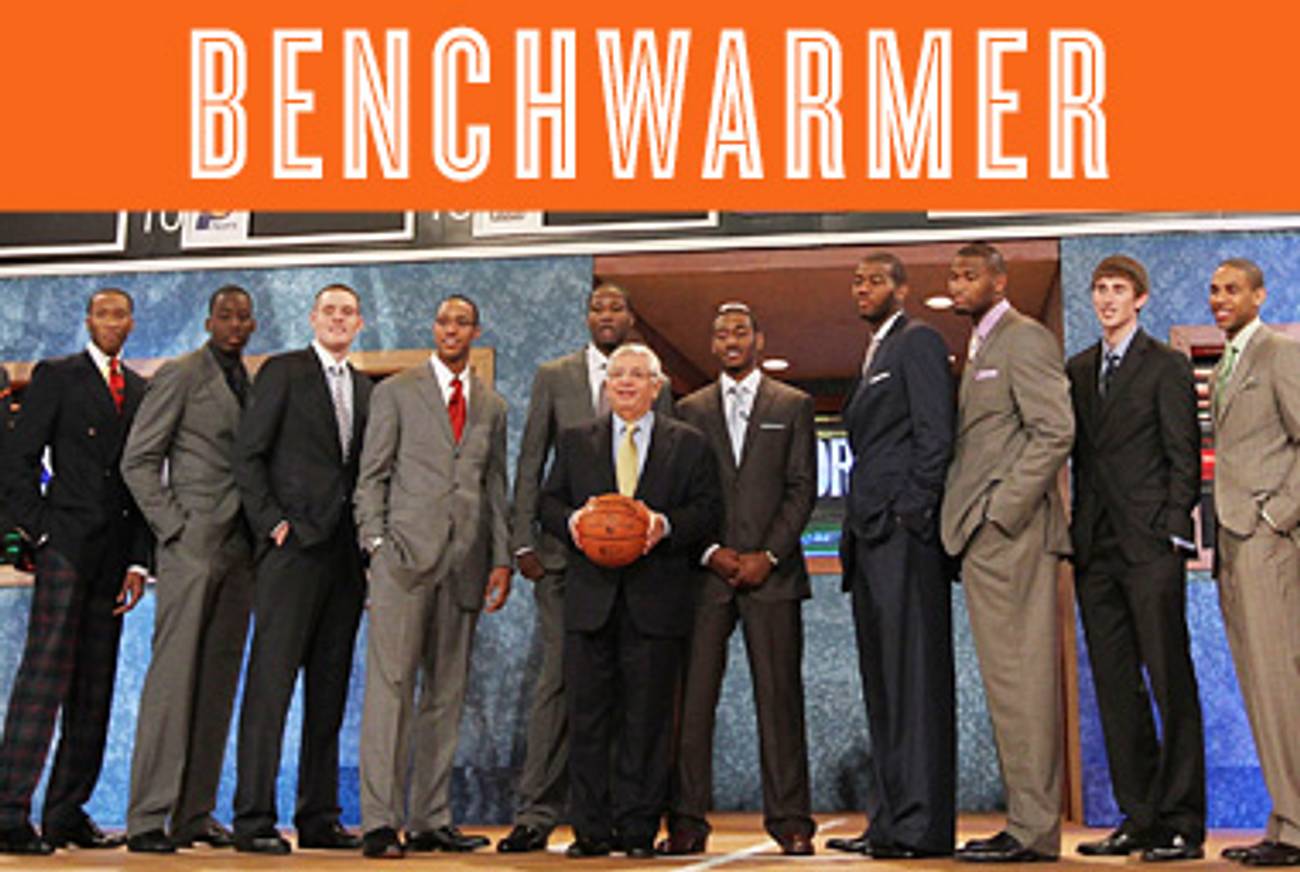At the height of NBA All-Star Game festivities last month, commissioner David Stern took the podium in front of a roomful of reporters. The weekend is supposed to be one big party, but with most national basketball reporters assembled in one city, the commissioner likes to make himself available for a round or two of questioning. Ideally, it’s a chance to remind the media of how swimmingly the league’s annual showcase is going. But this year, with labor unrest on everyone’s mind, the tone was anything but celebratory.
Stern, though, could not have been more in his element. In fact, watching him (it was broadcast live on NBA-TV, a premium channel available for the most devoted hoopheads), you couldn’t help but wonder if this wasn’t his own version of getting down. Roundish and silvery, the 68-year-old Stern always starts these press conferences easy and avuncular, feigning diplomacy as he fields some basic queries at the weekend’s brief labor meetings. Maybe he’s conserving his energy. As longtime league observers know, an engaged Stern is a sarcastic Stern.
When asked if the New Orleans Hornets, recently purchased by the NBA after owner George Shinn ran the franchise into the ground, would be staying in Louisiana, Stern’s answer was brief: “Yes.” Would he care to elaborate on that? “No”—emphatic, but flip. An Italian reporter wanted to know about similarities between the Hornets’ situation and that of the Seattle SuperSonics, whose relocation to Oklahoma City in 2008 remains one of Stern’s greatest miscalculations. Stern swoops in, mid-sentence, with a withering “All this from Italy?” Stern saves his best material, though, for a question about former referee Tim Donaghy, who in 2007 admitted to have bet on, but never fixed, games. ESPN’s Henry Abbott lays out the most recent developments, which consist mostly of co-conspirators’ latest books and a ream of expert data analysis.
Stern can’t resist the opportunity for a good takedown. “I’m happy that each All-Star Game or Finals offers another opportunity for a convicted felon to put out another tome,” he answers, acid dripping from the corners of his grin. When Abbott presses, Stern sends him sprawling: “I know you check your sources. I commend you to check the convicted felons’ sources.”
Now entering his 26th year of rule, David Stern is American professional sports’ longest-tenured commissioner and generally regarded as the most adept. Increasingly, that reputation has come under question. With the National Football League all but officially the new national pastime, it’s getting increasingly difficult to overlook its commissioner, Roger Goodell. And a vocal minority, among them the estimable Tommy Craggs of the sports site Deadspin, want Stern’s NBA predecessor, Larry O’Brien, to get due credit for laying the groundwork for Stern’s success. The NBA’s increased popularity internationally—perhaps Stern’s signature legacy—was more of an opportunistic than a visionary achievement, as basketball was already well established in other countries. And the exceedingly legalistic, anti-union climate Stern has cultivated—including three player lockouts on his watch, with another lurking on the horizon, and two referee ones—is a warped version of the stability and fairness that O’Brien had in mind when he tasked Stern, then the league’s general counsel, with overseeing the creation of its first real collective bargaining agreement.
Stern serves at the pleasure of his league’s owners; before joining the NBA, he was a union-busting attorney at Proskauer Rose, a major New York law firm. He was in the courtroom as an outside counsel during the NBA’s attempt to keep playground legend Connie Hawkins, railroaded by a kangaroo-court investigation into college point-shaving, out of the league indefinitely. When the players fought for a robust union and true free agency, it was against a much-younger Stern. He was, in a sense, on the wrong side of history, twice. Social justice would dictate that Hawkins, and later, the players, get their way. This was the peace that O’Brien sought to broker. At the same time, Stern saw a shaky league that buckled under the slightest pressure. To him, the future was one of safety and stability through meticulous rule-making and nonstop war on labor.
As players’ salaries climbed into the stratosphere, his position has become more and more tenable, and the idiot owners have become occasionally sympathetic—especially when players are cast as overpaid malcontents. This season’s new technical-foul guidelines, designed to further discourage complaining about calls, were a perfect example of this, as was 2005’s dress code, which basically mandated that noncompeting players dress like bankers at the arena. That neither of these innovations has actually been faithfully enforced is also vintage Stern: short-term annoyances that serve some arcane purpose in Stern’s ongoing attempt to spiff up the league’s brand. He is an equal-opportunity offender, toying with the players who think they have new rules to follow, the fans who fall for these press releases, and the reporters who cover the ensuing controversies.
Here’s the rub: Stern is an autocratic jerk, but it never feels like he loves power for power’s sake. Even at his most despotic, he values the justification, and the process, as much as he does the putting of his foot down. At bottom, Stern has a sense of humor—even if he doesn’t have enough of one to appreciate the Finger Gunz dance Gilbert Arenas performed merely days after he, then a Washington Wizards guard, brought firearms into the team’s locker room. Or maybe he just didn’t appreciate Arenas’ attempt to outwit him at his own game. But let’s not confuse Stern’s job, which he carries out with sheer ruthlessness, with the man—who, to folks like us, is one of the few real sports heroes Jews have left.
Stern should be the worst nightmare of Jews looking for empowerment through basketball, and especially of younger ones who have grown up with hoops as a corollary of hip-hop. On the surface, he’s a walking stereotype: a slick Jewish lawyer exploiting, and condescending toward, young black men, and seemingly always siding with money and power despite his personal politics. It may make sense that, as Jews moved up the socio-cultural ladder, they would go from some of basketball’s most excellent athletes (the players on Nat Holman’s City College teams of the 1930s and ’40s) to elite coaches (Red Auerbach and Red Holzman) to ownership and chief executive officerdom. But it would also make sense for a Jewish basketball fan to see this trajectory—and to see Stern, the immaculate embodiment of it—as violently unappealing. For some time now, I’ve wanted to make T-shirts of David Stern’s face with the caption “The Original Elder of Zion.” It’s a line I just can’t shake, and not only for its shock value; Stern is the Jewish NBA fan’s version of the n-word, a way back into the league through the least likely, most damning pathway possible.
Instead, Stern is a true Jewish—and truly Jewish—sports hero, a triumphant re-appropriation of all the dour trends he reflects: the Ultimate Boss who spars with reporters and radio hosts like the wheeling-and-dealing lawyer-macher that he is, responding, for example, to the question of whether a Detroit Pistons-Indiana Pacers playoff series was “dirty basketball”—which it undoubtedly was—by pointing out that the final game received the highest basketball ratings in ESPN history. Woody Allen became a cultural touchstone by turning the anxious, emasculated nebbish into his own kind of swaggering lothario. In this sense, Stern is as much a performer as any of the players, one who leverages personality to make his unseemly job seem vaguely charismatic (at least for certain audiences). With Stern, everything has a personal touch, from the joy he seems to feel when he appears at the NBA Finals to the grudges that anyone doing business in the league must learn to negotiate. There’s no such thing as good or bad policy, only Stern’s latest gambit. Unless we attach these words and actions to Stern, they often feel like repellent nonsense, the equivalent of players not named Michael Jordan wagging their tongues.
Stern’s personality—nervy, warm, sarcastic, doleful, and wrathful, and sometimes all at once—is unmistakably Jewish. We could take this even further and compare him, in his hot-and-cold demeanor, to the fickle Old Testament deity. Or further still, his approach to regulating and representing the league is often the kind of ever-shifting, seemingly contradictory yet ultimately coherent mess that, when a Jew does it, can often be glibly praised as “Talmudic.” Under Stern, the NBA has become a favorite subject of conspiracy theorists. Whether it’s the 1985 lottery that delivered Patrick Ewing to the Knicks; the “superstar calls” that ensure big names get to the foul line; the widespread, not incredible belief that the league will do whatever it takes to get teams from major television markets to the finals; or the lingering Donaghy scandal. More than any other league, the NBA must constantly fend off, or protect against, the belief that something fishy is going on. At times, you wonder just how oblivious some fans are to the historical ghosts they are summoning when they accuse Stern of pulling all the strings.
Omri Casspi, the Sacramento Kings forward who is the first Israeli to play in the NBA, has consistently disappointed in his second season. Amar’e Stoudemire, the New York Knicks star, forced us to follow him to Israel and back before we could simply be satisfied that this non-Jew at least keeps kosher and wears glasses. It may be wretched, and predictable, to find a Jew at the top of a professional sports league, but at least David Stern does it with his own kind of detached, predatory style. I may disagree with almost everything the man does, but I’ve never doubted for a second that we would get along. And when I listen to him cut down some poor AP reporter over the semantic difference between the loaded “travel overseas” and the longer, but innocuous, cross-country flight, I feel a bit of pride welling up.
Bethlehem Shoals is a founding member of FreeDarko.com. He has contributed to GQ, Salon, and Slate. Follow him on Twitter @freedarko.

